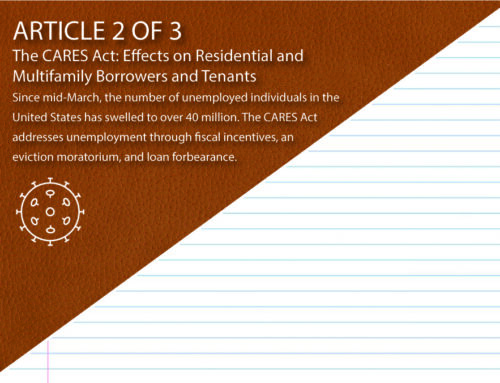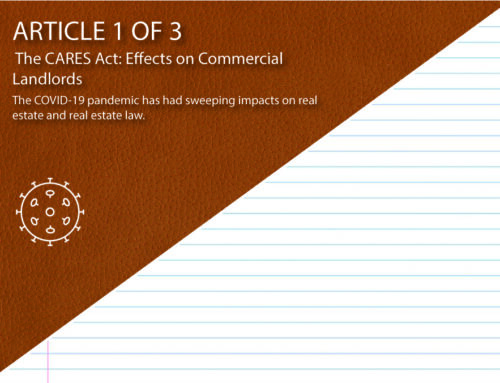This is the third article in a 3-part series and addresses effects of the Coronavirus Aid, Relief and Economic Security Act (the CARES Act) on bankruptcy proceedings.
While most coverage of the CARES Act has been focused on financial incentives and eviction moratoria, the CARES Act has also affected bankruptcy provisions applicable to bankruptcies filed under Chapters 7, 11, and 13 of the bankruptcy code.
Expansion of the Small Business Reorganization Act
The Small Business Reorganization Act (SBRA) was enacted in February 2020 and created Subchapter 5 under Chapter 11 of the bankruptcy code. In essence, the SBRA increases the ability of small business debtors such as commercial tenants and smaller real estate developers and owners to reorganize their businesses instead of liquidating under Chapter 11 of the bankruptcy code. Subchapter 5 contains numerous provisions which allows businesses with debts under $2,725,625 to reorganize more quickly and less expensively. For example, the bankruptcy plan must be filed within 90 days of filing for bankruptcy and such plans are often confirmed if the debtor contributes all disposable income for 3-5 years to make plan payments. Whether this rule of thumb is extended to the new Subchapter 5 process by bankruptcy courts remains to be seen.
Section 1113 of the CARES Act expands the SBRA for easier reorganization by those businesses negatively affected by COVID-19 by increasing the debt limit for small business debtors from $2,725,625 to $7.5M. This enables larger businesses with bigger debts to take advantage of the SBRA’s streamlined process. However, the CARES Act modification of the SBRA does have limitations. First, there is a limitation on the type of small business debtors which may take advantage of the increased debt limit.
They may not be:
- Publicly traded
- A single asset real estate company
- Affiliated with other debtors with a combined debt limit of over $7.5M
Further, the CARES Act expansion to the SBRA only applies to bankruptcies filed between March 27, 2020 and March 27, 2021. Qualifying businesses should be aware of this deadline when considering whether bankruptcy protections are beneficial to the business’ situation.
Amendment of the Definition of Income and Disposable Income
Section 1113 of the CARES Act also amends the definition of “income” and “disposable income” to exclude coronavirus-related payments from the federal government. In effect, federal coronavirus-related payments will not be considered for means testing under Chapter 7 or income testing to determine the length of a Chapter 13 plan. It is important to note that state and local payments are not included in the CARES Act and would, therefore, be considered income to Chapter 7 or Chapter 3 debtors. These changes are only effective until March 27, 2021.
Confirmed Chapter 13 Plans
For Chapter 13 bankruptcies with plans confirmed prior to March 27, 2020, Section 1113 of the CARES Act allows a debtor to request modification of a plan if the debtor is experiencing or has experienced a material financial hardship due, directly or indirectly, to the COVID-19 pandemic. It also allows debtors to extend plan payments for up to seven years after the initial plan payment was due, providing an extended glide path to plan completion and discharge from bankruptcy. These provisions are also only effective until March 27, 2021.
This article is for informational purposes only and is not intended as legal advice. This is a rapidly evolving area of law and the article is only current as of its date of publication. Please reach out to Ball Janik, LLP for the most updated information, state-specific information, and legal advice. Please also visit our COVID-19 webpage for resources by industry.






